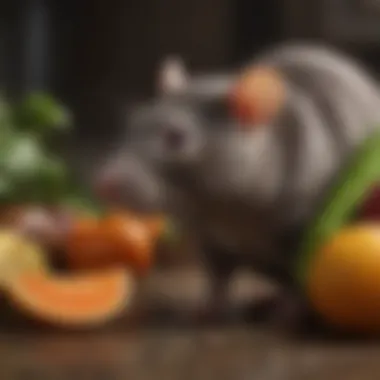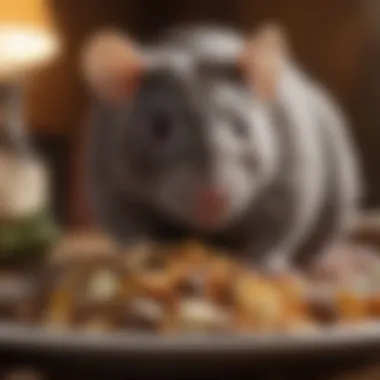Understanding Rat Nutrition: What Do Rats Like to Eat?


Intro
Rats are often overlooked as pets, yet they possess unique dietary needs that pet owners must understand. This understanding is crucial for promoting their health and well-being. Rats are omnivorous creatures, consuming a diverse range of foods in the wild. However, their dietary preferences can vary significantly based on several factors including age, health, and even breed. This article aims to illuminate the intricacies of rat nutrition, outlining what they enjoy eating, what they require nutritionally, and how to safely feed them.
Understanding Your Pet
Pet Behavior Basics
Understanding rat behavior is essential for any pet owner. Rats are social animals, enjoying interaction with both humans and fellow rats. This social aspect can influence their eating habits. A stressed or lonely rat may not eat as well as a content one. Observing their behavior can provide insights into their dietary preferences and needs.
Common Breed Characteristics
Different breeds of rats, such as Dumbo, Rex, or Standard, may exhibit variations in dietary needs or preferences. For example, Dumbo rats have larger ears which can make them more sensitive to certain sounds. This sensitivity may affect their eating habits as stress during meal times can deter their appetite.
Species-Specific Needs
Rats require a well-rounded diet that includes protein, carbohydrates, fats, vitamins, and minerals. Providing a mix of these nutrients is imperative for their health. Age also plays a significant role. Young rats, for instance, require more protein for growth, while older rats may need a lower protein diet to support kidney function.
Feeding Guidelines
Pet owners must adhere to specific feeding guidelines to ensure their rats thrive. It is advisable to offer a high-quality commercial rat food, which is formulated to meet their nutritional requirements. In addition to commercial diets, owners should incorporate fresh fruits and vegetables into their rats' meals. Foods such as apples, blueberries, or carrots can be offered in moderation.
"A balanced diet is fundamental for maintaining rat health and longevity."
When feeding rats, avoid processed foods, sugary snacks, and any foods toxic to them, such as chocolate, garlic, and onion. Monitor their food intake to prevent obesity. A general guideline is to provide about 15 to 20 grams of food per rat daily.
Health and Wellness
Regular health checks are vital. Routine vet check-ups can help identify any nutritional deficiencies or health concerns. Vaccinations are essential for preventing illnesses, though specific requirements may vary by region. Observing your rat's eating habits can signal health issues. If a rat suddenly loses interest in food or shows signs of distress while eating, a vet visit is warranted.
Enrichment and Activities
Lastly, enriching your rat's environment can positively influence their eating habits. Providing toys and social interactions can reduce stress and promote a healthy appetite. Socializing with other rats or engaging them in playtime can encourage more regular feeding habits, as happy rats are more likely to eat regularly.
Preface to Rat Dietary Preferences
Understanding rat dietary preferences is not just about what these creatures like to eat. It involves a deeper insight into their health and well-being. For pet owners and animal lovers, knowing the right foods for rats ensures they can lead happy, long lives. Just like humans, rats require a balanced diet that caters to their nutritional needs. A proper diet supports their growth, enhances their immune system, and promotes overall vitality.
When feeding a rat, it is crucial to consider both the types of food that are beneficial and the variety they enjoy. This knowledge empowers owners to make informed choices, mitigating any risks associated with poor nutrition. A diet that aligns with a rat's natural preferences not only keeps them content but also involves them in their culinary experiences.
The Importance of Proper Diet
A proper diet is vital for a rat's health. Much like other animals, rats are affected by the nutritional choices made for them. An inadequate diet can lead to numerous health issues, including obesity, digestive disorders, and reduced lifespan. Rats are opportunistic feeders, which means they can be picky, but their instinct drives them to select foods rich in nutrients. Providing a diet that includes essential vitamins and minerals will improve their energy levels and overall behavior.
Moreover, an appropriate diet fosters a strong bond between the pet owner and the pet. Observing a rat enjoying its food can be fulfilling and creates positive interactions. Additionally, proper nutrition can prevent common ailments seen in domesticated rats, reducing vet visits and expenses over time.
Evolutionary Background of Rats
Rats have evolved as foragers, adapting their dietary habits to their environmental conditions. Originating as wild animals, they primarily consumed whatever was available, including grains, fruits, and even insects. This diverse natural diet has shaped their nutritional requirements over generations.
In the wild, rats have specific preferences that help them survive. For instance, their attraction to certain seeds and plants is a result of instinctual foraging behavior, developed to ensure they select energy-dense and nutrient-rich food sources. Understanding this evolutionary background is essential for pet owners who want to replicate a balanced diet for their domesticated rats. Given their original habitats, a diverse diet closely mimicking their natural intake can greatly influence their health and happiness.


This section lays the groundwork for exploring the natural diet of rats in more detail. Knowing what rats eat in nature and why they prefer such foods helps in curating an appropriate diet that will foster their well-being.
Natural Diet of Rats
Understanding the natural diet of rats provides valuable insights into what they thrive on. This aspect of rat nutrition is crucial for pet owners seeking to optimize their pets' health and well-being. Rats, being omnivorous, have diverse dietary preferences, and knowing their natural food sources can help in creating a balanced diet. By focusing on elements such as nutritional value, availability in the wild, and the biological needs of rats, pet owners can ensure that they provide appropriate food that enhances the vitality of their furry companions.
What Wild Rats Consume
In the wild, rats have a varied diet that comprises several food groups. They often eat whatever is conveniently available in their environment. This adaptability allows them to survive in different habitats. Common food sources include fruits, seeds, grains, and even small insects or animal remains. Their diet allows them to meet the energy demands necessary for their active lifestyle. It's also important to recognize the role of instincts; wild rats often instinctively know which foods are safe and beneficial. The information obtained from observing wild rat diets serves as a guide for pet owners when selecting foods.
Seeds and Grains
Seeds and grains are fundamental components of a rat's natural diet. These foods are not just readily available, but also highly nutritious, providing essential carbohydrates and fats that support energy levels. Common seeds that wild rats might consume include sunflower seeds and pumpkin seeds. Grains, such as oats, rice, and wheat, offer a similar nutritional profile and are often found in commercial rat foods. When including seeds and grains in a pet rat's diet, moderation is key. Too much can lead to obesity due to high fat content.
Fruits and Vegetables
Fruits and vegetables are vital for a rat’s diet, contributing important vitamins and minerals. Wild rats often consume berries, apples, and various leafy greens. These foods provide hydration and essential nutrients which boost the immune system. When introducing fruits and vegetables to a pet rat’s diet, it’s important to wash them thoroughly and to remove any seeds that could pose a health risk. A good practice is to offer a small variety of fruits and vegetables to monitor preferences and reactions.
Insects and Protein Sources
Wild rats also require protein to maintain their health, which they obtain from insects and other small animals. This protein is necessary for growth, repair, and overall bodily functions. Insects like crickets and mealworms are often part of the wild rat diet. For pet rats, it can be beneficial to include protein sources. Commercially available insect-based snacks can help in replicating this aspect of their natural diet. Ensuring that rats have protein-rich foods helps to fulfill their dietary needs and contributes to their overall well-being.
Factors Influencing Rat Food Preferences
Understanding the factors that influence rat food preferences is essential for caregivers wanting to optimize the health and well-being of their pets. Rats, as social and intelligent creatures, have a unique relationship with their food that goes beyond basic sustenance. Their preferences can be shaped by a multitude of elements including age, health, and individual behavior. Recognizing these factors helps caregivers provide a balanced and enjoyable diet, promoting not just health, but also happiness among their pets.
Age and Nutritional Needs
As rats advance through different life stages, their nutritional requirements change significantly. Young rats, or pups, have high energy needs due to their growth. They require diets rich in protein and calcium to support proper development. As rats mature into adults, like in many species, their dietary focus shifts. Adult rats need a balanced diet that maintains health and prevents obesity, which can lead to various complications.
Additionally, senior rats often face different challenges, such as tooth problems or decreased activity levels. Their diets may need to be adjusted to softer foods or those with lower calories to ensure they do not face health risks. Tailoring food choices according to age ensures that rats receive what they need for their specific life situation.
Health Status and Diet
A rat's health condition greatly influences its food preferences and needs. Rats suffering from chronic conditions might require special diets to manage their illnesses effectively. For example, pets with diabetes need food that maintains blood sugar levels, while those with kidney issues may benefit from lower protein intake.
The importance of quality food cannot be understated. It is vital for recovery and daily functioning. Understanding how health status affects diet empowers pet owners to make informed decisions. Monitoring weight and ensuring regular veterinary check-ups can help in adjusting diets based on the rat's health status.
Individual Personality and Behavior
Just like humans, each rat has its own personality, and this can affect feeding behaviors. Some rats may be more adventurous and willing to try new foods, while others might be more cautious and stick to familiar options. Individual preferences may also extend to specific textures or tastes. For example, a rat may prefer crunchy foods over softer options or be drawn to sweeter fruits rather than bitter vegetables.
Analysis of a rat’s personality will help pet owners provide a stimulating feeding experience. Offering a variety of foods can encourage exploration and prevent boredom. This may also encourage bonding between the owner and the pet as they share food experiences. Pet owners should observe and learn their rats' tastes and interest, adapting their approach in feeding accordingly.
Understanding these factors allows pet owners to create a tailored feeding plan that meets their rats' unique needs.
By keeping these points in mind, caregivers can greatly enhance their rats' feeding experience, ensuring that they are not only receiving the right nutrition but also enjoying their meals.
Commercial Rat Food Explained
Commercial rat food is an essential aspect of caring for pet rats. Unlike their wild counterparts that foraged for various foods, domesticated rats rely on prepared diets to meet their nutritional needs. This segment will elaborate on the different types of commercial food available, the importance of understanding nutrition labels, and the evaluation of quality options versus cheaper alternatives.


Types of Rat Pellets
When selecting rat food, it is crucial to understand that not all pellets are created equal. Various types exist to cater to the diverse needs of pet rats. The primary categories include:
- Nutritional Pellets: These are formulated to provide balanced nutrition that covers all essential vitamins, minerals, and proteins. They often contain specific ingredients tailored for the health of rats.
- Grain Mixes: These blends combine pellets with grains like oats, corn, and barley. They can be enticing for rats but may lack balanced nutrients if not formulated correctly.
- Seed Mixes: These types contain assorted seeds such as sunflower and pumpkin seeds. While they are high in fat, they often don't provide adequate overall nutrition if fed exclusively.
- Fresh Food: While not pellets in a traditional sense, some commercial brands offer fresh or freeze-dried options that can be included in a rat's diet for added variety and hydration.
Each type has its pros and cons. Careful selection ensures that the rat receives a comprehensive diet.
Nutrition Labels Deciphered
Reading nutrition labels is vital for pet owners. Understanding the components provides insights into the diet's quality. Important elements include:
- Guaranteed Analysis: This section lists the minimum percentages of protein and fat and the maximum percentages of fiber and moisture. Look for a higher protein content, around 16-20%, and lower fat content, ideally under 6%.
- Ingredients List: The first five ingredients usually indicate the food's primary components. A good mix will have whole food items like specific grains, fruits, and proteins listed first. Avoid brands that list fillers or artificial ingredients prominently.
- Additives and Preservatives: Ensure that the food does not contain harmful additives like BHA or ethoxyquin, which can affect rat health if consumed over time.
By paying attention to these details, pet owners can make informed choices about their rat's diet.
Quality vs. Cheap Options
In the realm of commercial rat food, pricing can greatly vary. It's tempting to opt for the lowest-priced options. However, this may compromise the rat's overall health.
Quality options tend to use better ingredients and have been formulated based on research into rodent nutrition. Brands like Kaytee and Oxbow are popular among experienced pet owners for their high-quality ingredients.
Cheap options may contain fillers and lack essential nutrients, which can lead to health problems in the long run. Rats are susceptible to obesity and nutritional deficiencies if not fed properly. Consequently, investing in quality food is often more cost-effective over time, as it can prevent health-related expenses.
"Investing in proper nutrition today can mean fewer health issues tomorrow."
Ultimately, understanding commercial rat food is not just about feeding these pets but ensuring their overall well-being and longevity.
Feeding Rats Human Foods
Feeding rats human foods is an important consideration for pet owners. Rats are naturally curious and adaptive creatures, often drawn to human meals. Integrating safe human foods into their diet can offer nutritional benefits and enhance their quality of life. However, caution is required to ensure that these foods do not compromise their health. This section explores safe options, potential hazards, and the overall impact of human food on rat nutrition.
Safe Human Foods for Rats
When selecting human foods for your pet rat, focus on options that provide essential nutrients without added sugars, salt, or unhealthy fats. Here are some safe and nutritious choices:
- Fruits: Apples, pears, and bananas can be healthy treats. Always remove seeds and cores before feeding.
- Vegetables: Leafy greens like spinach and kale, along with carrots and broccoli, are excellent choices. These are rich in vitamins and minerals.
- Whole grains: Small amounts of cooked rice, quinoa, or oats can be included. Avoid processed products rich in sugar.
Incorporating these foods into their diet can stimulate their taste buds and encourage exploration of new flavors. It's essential to introduce any new food gradually to monitor for any adverse reactions.
Foods to Avoid
Not all human foods are suitable for rats. Several items can be harmful or even toxic to them. Own a list of foods to keep away from your pet:
- Chocolate: Contains theobromine, which is toxic to rats.
- Caffeine: Can lead to increased heart rate and nervousness.
- Onions and garlic: These can cause blood issues in small animals.
- Processed foods: Fast food items, snacks, and goodies often have high salt and sugar content, detrimental to rat health.
Always err on the side of caution. If uncertain about a food item, look for more information or consult a veterinarian.
Feeding rats human foods requires a balance of creativity and responsibility. Focus on making thoughtful choices that will keep your pet healthy. Knowing which items are safe and which to avoid enhances the well-being of your furry companions.
Risks of Improper Feeding


Understanding the risks associated with improper feeding is critical for anyone caring for pet rats. Rats are resilient creatures, but their dietary habits can easily lead to serious health issues if not managed properly. Many pet owners may not realize that certain foods, whether human or commercial, may not provide the necessary nutrients. Additionally, feeding inappropriate food can quickly pave the way to multiple health problems. By focusing on the problems that can arise from poor feeding practices, this section aims to underscore the importance of informed dietary choices for sustaining a rat's health.
Obesity and Its Consequences
One of the most pressing risks of improper feeding in rats is obesity. Rats, like many other animals, have a tendency to overeat when presented with food that lacks nutritional balance. For example, high-calorie treats or rich human food can lead to excessive weight gain. This obesity is not just a cosmetic issue; it can result in significant health problems, including:
- Diabetes: Obese rats are at a higher risk of developing diabetes, which can greatly diminishes their quality of life.
- Heart Disease: Excess body weight can lead to cardiovascular issues, affecting their overall vitality.
- Joint Problems: Carrying extra weight puts additional strain on their joints, causing pain and difficulty in movement.
- Decrease in Lifespan: Overall, an unhealthy weight can shorten a rat's life expectancy. It is essential for pet owners to monitor their rat's weight continuously and adjust their diet to prevent these health concerns.
Digestive Issues
Improper feeding can also lead to various digestive troubles in rats. Their digestive system is delicate, and sudden changes in diet can upset their gut flora. Common consequences stemming from incorrect feeding include:
- Diarrhea: Consumption of rich or unfamiliar food can cause loose stools, leading to dehydration. Diarrhea can therefore be a sign of dietary indiscretion.
- Constipation: On the other hand, a diet lacking proper fiber may result in constipation, forcing the rat to strain when trying to eliminate waste.
- Bloating: Some foods may lead to gas formation in the intestines, causing discomfort or pain.
Proper diet is vital to maintaining a healthy digestive system in pet rats.
Pet owners should be aware of their rats' reactions to different foods. Observing any changes in behavior, stool consistency, or appetite will help in identifying any potential digestive problems early on.
Establishing a Balanced Diet for Your Rat
A balanced diet is vital for maintaining the health and well-being of rats. Rats are small mammals with specific dietary needs that must be met for their overall health. Understanding these needs helps in creating a diet that supports growth, energy levels, and longevity. A balanced diet prevents nutritional deficiencies, ensuring that your rat receives all necessary nutrients.
Benefits of a Balanced Diet
- Promotes healthy growth and development.
- Supports a strong immune system.
- Helps prevent obesity and related diseases.
- Encourages natural behaviors through foraging and chewing.
When establishing a balanced diet, several factors need to be taken into account. These include the rat's age, health status, and individual preferences. Each rat might have unique tastes, but focusing on their nutritional requirements will ultimately yield the best results in the long term.
Daily Nutritional Requirements
Daily nutritional requirements are essential for the health of your rat. Rats need a combination of carbohydrates, proteins, fats, vitamins, and minerals. Each nutrient plays a specific role.
- Proteins are critical for growth and tissue repair. Sources can include commercial rat pellets, cooked eggs, and certain legumes.
- Carbohydrates provide energy. Whole grains like oats and small amounts of fruits can be included.
- Fats are necessary for maintaining healthy coat and skin. Healthy sources, such as nuts or seeds, should be given in moderation.
- Vitamins and minerals support various bodily functions. Fresh fruits and vegetables are essential to provide these nutrients.
It's important to consult a vet to determine the exact nutritional needs of your rat, as these can vary based on factors such as age, weight, and activity level.
Feeding Frequency and Portions
Feeding frequency and portion sizes are also important considerations. Young rats need more frequent meals due to their rapid growth. Adult rats typically do well with one or two feedings per day.
- Portion Control: Provide measured amounts to prevent overeating. A typical serving might range from 1/4 to 1/2 cup of pellets per day, adjusted based on individual needs.
- Fresh Foods: If offering fresh fruits and vegetables, limit them to small quantities to avoid digestive issues. A teaspoon of treats like carrots or apples can be sufficient.
Key Consideration: Monitor your rat's body condition and adjust the diet as necessary. Overeating can lead to obesity, while inadequate portions can cause malnutrition.
In summary, a balanced diet tailored to the needs of your rat facilitates the best health outcomes. Proper knowledge about their daily requirements and feeding patterns is crucial. By adhering to these guidelines, you can create a diet that is not only enjoyable for your pet but also enhances their quality of life.
The End
The exploration of rat nutrition is vital for understanding the well-being of these intelligent rodents. Proper nutrition helps maintain their health and happiness, leading to a better relationship with pet owners. Insufficient knowledge about what rats eat can lead to poor feeding practices, creating health hazards.
In this section, we summarize key elements discussed earlier. The importance of a balanced diet cannot be overstated. Nutritional requirements vary depending on age, health status, and specific behaviors of the rat. These factors play a significant role in food selection and overall health. A balanced diet encourages physical fitness, aids in growth, and supports the immune system.
Additionally, the discussion around commercial rat food and human food options brings to light the benefits and risks associated with various feeding methods. The right choices can lead to happier, healthier rats, preventing several complications associated with obesity and digestive issues.
Ultimately, understanding rat nutrition is not just about satisfying their hunger. It directly impacts their quality of life. When pet owners prioritize proper dietary practices, they ensure that their furry companions thrive. This understanding fosters not only the well-being of the rat but also a more satisfying experience for the owner as they bond over shared moments.
"Nutrition is the foundation of health; it is where happiness begins."







